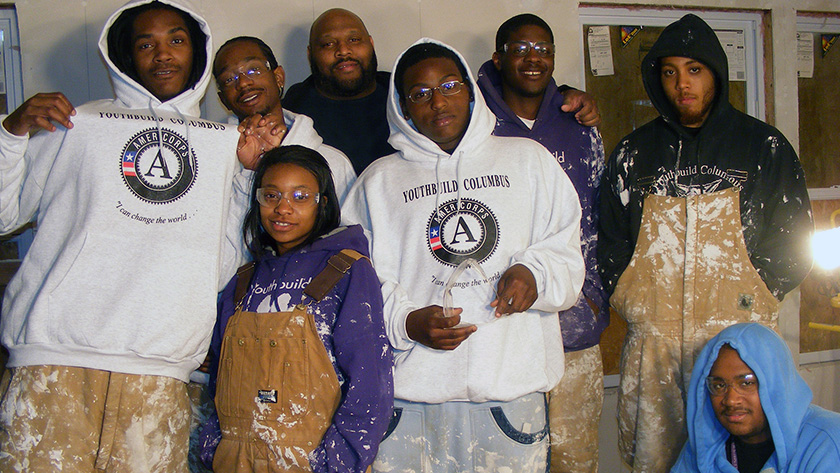Where does the concept of individual and universal “well-being” fit in the future society we aim to create?
It is, of course, central to both the goals and to the process of change. As a goal, we want all human beings to be free to fulfill their highest potential and noblest aspirations within a peaceful and satisfying sense of belonging to a just and equitable larger community that is committed to the common good. Right? And as for the process, we want everyone who is working to achieve that goal to have the peer support and personal healing processes available to both avoid burn-out and lead to appropriate and successful actions.
Every successful initiative of every social entrepreneur integrates various principles and practices that promote the personal well-being of its leaders, its staff, its members, and the residents of the communities it serves.
Principles and practices supporting well-being were built into the YouthBuild network from its beginning in 1978 and developed throughout its dynamic national and international expansion to its current size of 250 YouthBuild programs in the USA and 80 in 21 other countries. Over the years, more than 200,000 YouthBuild students have built over 35,000 units of affordable housing in their communities, while simultaneously advancing their own education, employment prospects, and building their civic leadership skills.
YouthBuild’s practices addressing well-being have been very stable over time, and very effective. They were based on awareness of the immediate needs and higher aspirations of the millions of marginalized young people YouthBuild was designed to embrace, as well as those of the thousands of staff dedicated to creating new institutions promoting justice, opportunity, and community for all.
The first and most fundamental principle is respect for the intelligence of all participants. Respect for the ideas, experience, insight, vision, knowledge, and understanding of people who have been pushed and locked out of society is a direct contradiction to a core and consistent element of their oppression: that is, disrespect, even contempt and disregard, for their intelligence and value as human beings.
In fact, all the principles and practices supporting well-being were designed as deliberate contradictions to the realities of oppression, exclusion, and exploitation built into the injustices of our social and economic systems. But before I spell out those practices, let me explain simply the basic design of YouthBuild programs.

In YouthBuild programs, young adults who were born into poverty and have faced enormous challenges resulting in their leaving high school without a diploma and being unable to find a job, join YouthBuild full-time for about a year. They enter between the ages of 16 and 25. They work toward their GED or high school diploma in highly supportive and individualized classrooms for half their time. In the other half they are trained and paid to build affordable housing for homeless and low-income people in their communities. It’s all knit together with caring adult and peer counseling, and an emphasis on community service and leadership development.
Upon completion, they are ready for college, and/or for decent-paying jobs in the construction industry. In recent years many local programs have added the option of hands-on experience and industry- certified training in additional careers such as health care, good food, retail service, and technology. However, the core design of empowering students to build tangible, visible, and highly valued housing in their neighborhoods is unequaled in its power to transform students’ view of their own role in their communities.
In summary, the components of the program include education, job training, personal counseling, community service, leadership development, and placement in jobs and/or post-secondary education.
Looking at basic components is one way to get an overview of the YouthBuild program. It is equally essential to understand the program qualities that create a meaningful, inspiring, and transformational program culture. If the program components are implemented without integration of these qualities, the program is likely to fail.
YouthBuild students arrive with years of negative experiences in various institutions. Programs must deliberately create a culture that is the direct opposite of these past experiences. From the moment applicants walk in the door, they should experience safety, profound respect, deep caring, and a sense of community, with high standards, positive values, and a clear path to a hopeful future.
The following 17 qualities have proven to create a successful environment, supporting the well-being of every member:
In this context, what rises in the hearts of most of the students is a deep desire to change the conditions of poverty for the young people coming behind them. Therefore, YouthBuild tries to empower them with the skills to become community leaders so they can fulfill that vision. For more on leadership development from John Bell, YouthBuild co-founder, see his book YouthBuild’s North Star. This combined set of transformational components and qualities can be summarized as the power of love coupled with opportunity.
Of course, to make those qualities real there need to be specific practices intentionally implemented. Here are a few:
Youth Policy Councils: Every YouthBuild program has a peer-elected youth policy council. Ideally, it meets at least every other week with the head of the organization and the YouthBuild program director to discuss the key issues facing the program. This demonstrates that the most powerful people in the organization respect their ideas. The directors get the input of the students not only on program implementation but also on every hiring decision. Nothing impacts a sense of being respected more than interviewing prospective staff!

Life Plans: Young people need to set goals and a path to achieving them in all areas of their lives: family, education, employment, spiritual life, friends, community, and leadership…and any other categories that matter to them. What do they want to do? Who do they want to become? How can they get there? Built into the best YouthBuild programs is a regular meeting process for each student with an adult mentor who helps them develop and progress toward their unique life plans.
Equal Time Support Groups: Starting in orientation, YouthBuild programs have practiced support groups of 4 to 6 students, with a skilled staff facilitator, in which each member gets equal time to tell their life stories. After they know each other well, the support groups are used to address whatever is uppermost in their minds. The rest of the group listens attentively to each speaker. At the end of each person’s time speaking, the two people sitting on either side of them appreciate them: tell them what they like and admire about them.
Few get as much appreciation in life as they deserve, so building appreciations into every context creates an important positive sense of safety, trust, and belonging.
In equal time support groups young people will often go directly to the deepest pain they are carrying. They will share things they’ve never told anybody… because they’ve never before had six or eight uninterrupted minutes of being listened to by a caring group, and their pain has been needing a healing ear for a long time. When this happens, as it often does, many will cry as they share their painful history. The staff who handle this best are the ones most comfortable with their own pain, have systems for handling it, and know that crying is a healing process not a crisis of collapse.
Of course, building a culture in which the skills, intelligence, and input of staff are highly valued, respected, and steadily developed is just as essential as integrating the qualities into the program for the young people. The love and respect cascades down from the top: from the board chair and the board, to the Executive Director, to the staff, to the young adults, to their families, to the community. There is no group who can be skipped.
And then, to sustain this work, regardless of the strength of the program culture, staff and directors also need to heal from their own early hurts. They need to build a life with love and support for themselves, manage a life balance that includes getting enough sleep, healthy food, exercise, time with family and friends. They need time to learn new things and go to new places, time to meditate and/or pray if they so choose, and time to commune with the beauties and mysteries of nature. They need processes for sharing, releasing, and healing from their own pent-up pain and trauma that if not released may negatively affect their resilience and their rational decision-making.
We can all organize our lives to include the elements we consider key to our well-being, and it is our responsibility to do that. As one of my mentors once taught me: “People don’t tend to follow a leader who appears distressed. Your own well-being will strengthen your positive impact.
Want more stories of transformational change on the world’s most pressing problems? Sign up for Skoll Foundation’s monthly newsletter.